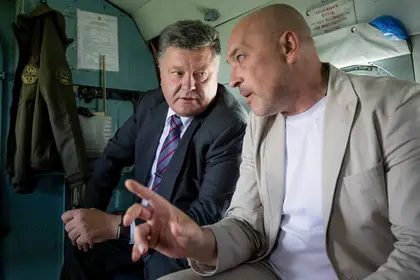Like recently appointed Odesa
Oblast Governor Mikheil Saakashvili, Tuka, a 51-year old native of Kyiv, is an
outsider to Ukraine’s bureaucratic system. Many expect Tuka, who was an
activist in the 2013-2014 EuroMaidan Revolution, to reform the region’s government
and crack down on corruption in the war zone.
The move follows previous
Luhansk Oblast Governor Hennady Moskal’s appointment as head of Zakarpattia
Oblast in the wake of armed clashes between police and activists of the Right
Sector nationalist group in that region.
JOIN US ON TELEGRAM
Follow our coverage of the war on the @Kyivpost_official.
As governor and head of the
oblast’s civilian-military administration, Tuka will have direct influence on
the nation’s war effort. The southern part of Luhansk Oblast, which borders
Russia on the east, has been occupied by combined Russian-separatist forces,
and a pseudo-government set up there that calls itself the “Luhansk People’s
Republic.”
Tuka will have to tackle
urgent problems such as pervasive corruption and smuggling in the war zone, as
well as raise funds to reconstruct destroyed buildings and accommodate
internally displaced people, Taras Berezovets, head of political consulting
firm Berta Communications, told the Kyiv Post. He will also have to combat the
impact of Russian television propaganda, which is still highly influential in
the region, and prevent Russian-separatist terrorist attacks.
Presenting Tuka as the new
governor during a visit to Luhansk Oblast on July 22, Ukrainian President Petro
Porohshenko said Tuka was part of a “new generation” in Ukrainian politics, and
hinted that some might not be happy with his appointment.
“I’ve made my choice, and
some say that my choice is very risky and that that’s not the way it should be
done in our system, but I believe there’s a new generation,” Poroshenko said.
“… I’m sure you don’t like the word ‘politics’ but this is a new kind of
politics that’s close to the people. Heorhy, you have the president’s full
support.”
Berezovets said the
appointment was likely influenced by public opinion, which is highly favorable
to volunteers helping the military. Poroshenko’s people usually meet with
experts and journalists before such appointments, he said.
Yury Kasyanov, another
well-known volunteer helping the army, said by phone that Tuka would have to
“either adapt to the system and abandon his principles” or “clash with the
system – which is unlikely.”
“An unreformed system will just
digest him,” Kasyanov added.
He argued that the
authorities must launch a thorough overhaul of the entire bureaucratic system,
not just change the people at the top.
Kasyanov also said Poroshenko
aimed to boost his own ratings by appointing Tuka.
“The president takes under
his wing other well-known people’s ratings to compensate for losses to his
image due to a lack of reforms, decreasing living standards, and increasing
discontent,” he said.
Tuka, a graduate of Kyiv
Polytechnic Institute, used to work in the telecommunications industry.
Previously he wrote on
Facebook that he had owned a firm that supplied mobile communications
equipment. He also used to live in Egypt and took part in the 2011 Egyptian
Revolution.
Subsequently Tuka
participated in Ukraine’s EuroMaidan Revolution and was injured in clashes with
riot police on Feb. 18, 2014.
In March 2014 he founded
Narodny Tyl (the People’s Home Front), a volunteer group that helps the
Ukrainian army. He later co-founded Ukraine – a United Country, a party that
received 0.12 percent in the Oct. 26, 2014 parliamentary election.
Tuka also runs Mirotvorets
(Peacemaker), an Internet project that publishes the personal data of
Kremlin-backed separatists.
Berezovets said Tuka had not
been implicated in any corruption scandals, while Kasyanov described him as “an
honest, reasonable and hard-working man.”
Kyiv Post staff
writer Oleg Sukhov can be reached at [email protected].
You can also highlight the text and press Ctrl + Enter




